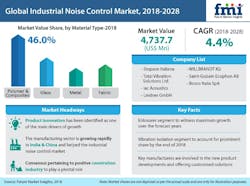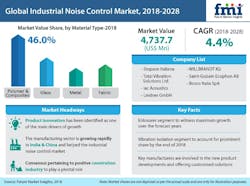Industrial noise control market will be worth $7,309 million by 2028
A new study by Future Market Insights (FMI) finds that the industrial noise control market is expected to grow at a 3.7 percent year-over-year rate in 2019 as many still seek to find ways to reduced the noise. According to FMI, more than 152 million units of industrial noise control systems, worth $4.8 billion, were sold in 2018.
FMI point to four key factors influencing the growth of industrial noise control market:
- Growing awareness of harmful levels of industrial noise
- Increasing emphasis on the protection of workers and employees from noise pollution
- Stringent environment regulation related to industrial noise control
- Incorporation of integrated noise control technologies in advanced industrial machinery
The report also shows that industrial noise control industry is witnessing a shift toward biodegradable materials over traditional materials. Manufacturers are incorporating green and sustainable materials in design and development of industrial noise control units to align with the ongoing sustainability trend.
The FMI study finds that polymer and composites are highly preferred materials for the manufacturing of industrial noise control units. More than four in ten industrial noise control units sold in 2018 were made of polymer and composites.
Polymers and composite materials have higher soundproofing properties as compared to other materials such as glass, metal and fabric.
The FMI study also finds that more than eight in ten industrial noise control units sold in 2018 were equipped with vibration isolation unit. As vibrations can significantly impact the overall productivity and durability of a range of industrial machines, machine builders must monitor vibration and corrosion.
FMI analyzed demand trends of different vibration isolation units such as isolation/machinery pads, isolation mounts, equipment bases and spring isolators. Among these, sales of isolation mounts were higher in 2018 and the demand trend will continue in the future as manufacturers introduce advanced and more efficient vibration isolation mounts.
The industrial noise control market is also studied for flexible and rigid industrial noise control instruments by FMI. While both these noise control units significantly address noise pollution issues, FMI study finds that flexible noise control units accounted for the second highest sales in 2018 and demand for rigid noise barriers is expected to grow at 4 percent in 2019.
The FMI study estimates that demand for industrial noise control units for internal noise control application remained higher as compared to the application in external noise control. Seven in ten industrial noise control units sold in 2018 were for internal application.
According to the FMI study, the manufacturing sector remains a prominent end user of industrial noise control units. Different manufacturing industry verticals such as electrical & electronics, industrial machinery, automotive, metal and others significantly integrate industrial noise control measures.
Over seven in ten industrial noise control units were sold in the manufacturing sector in 2018, wherein industrial machinery vertical account for the highest sales. As keeping the noise within the OSHA levels in the different manufacturing sector is pivotal in ensuring health and wellness of employees.


